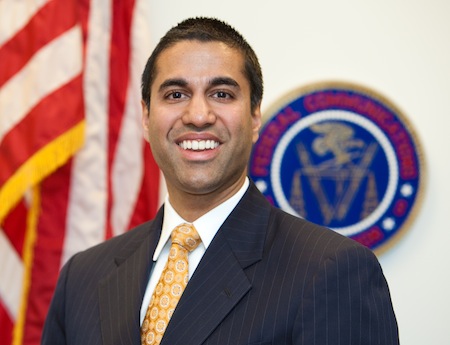Pai: Title II Has Depressed Broadband Investment

The smarter way to stay on top of broadcasting and cable industry. Sign up below
You are now subscribed
Your newsletter sign-up was successful
FCC commissioner Ajit Pai says that the "facts and evidence" suggest that the FCC's decision to impose Title II regs on broadband—he still calls it the "Obama" decision—has indeed slowed infrastructure investment and deployment, as he and ISPs had predicted.
FCC chairman Tom Wheeler and other Title II backers had dismissed arguments that classifying broadband as a common carrier service would depress investment, and Pai said in a speech to the American Enterprise Institute Wednesday that he had no doubt they "desperately hoped for their forecast to come true."
But Pai, leaning on the kind of historical reference that Wheeler is noted for, said that "as John Adams warned over two centuries ago, 'whatever may be our wishes, our inclinations, or the dictates of our passions, they cannot alter the state of facts and evidence.'”
As evidence, Pai pointed to research that showed a decline in capital expenditures by the major wireless companies of 12% in the first half of 2015 compared to the same time period in 2014—when the FCC was still expected to restore open Internet rules without reclassifying broadband.
"Only twice before have broadband service providers’ capital expenditures fallen on a year-over-year basis," he said, "following the dot.com bust in 2001 and the Great Recession in 2008."
"In my statement dissenting from the Commission’s Title II decision, I warned that '[b]roadband networks don’t have to be built. Capital doesn’t have to be invested here,'" Pai said. "'Risks don’t have to be taken. The more difficult the FCC makes the business case for deployment—and micromanaging everything from interconnection to service plans makes it difficult indeed—the less likely it is that broadband providers big and small will connect Americans with digital opportunities.' And that I fear is what we are now witnessing."
Pai suggested no one should be surprised at that outcome. "When the FCC makes it less attractive for broadband providers to invest in networks serving the American people, they will find other places to put their money," he said.
The smarter way to stay on top of broadcasting and cable industry. Sign up below
The commissioner did not lay all the blame at the feet of Title II, though he was placing it at the FCC and what he said were decisions to slow the IP transition by making it harder for carriers to retire legacy copper networks. "These regulatory roadblocks are bad for consumers, bad for infrastructure investment, and bad for our nation’s economic competitiveness."
Pai's speech came only days before the FCC's Sept. 14 deadline for its brief defending Title II reclassification against lawsuits filed by cable and telco ISPs, VoIP pioneers and others.
Contributing editor John Eggerton has been an editor and/or writer on media regulation, legislation and policy for over four decades, including covering the FCC, FTC, Congress, the major media trade associations, and the federal courts. In addition to Multichannel News and Broadcasting + Cable, his work has appeared in Radio World, TV Technology, TV Fax, This Week in Consumer Electronics, Variety and the Encyclopedia Britannica.

